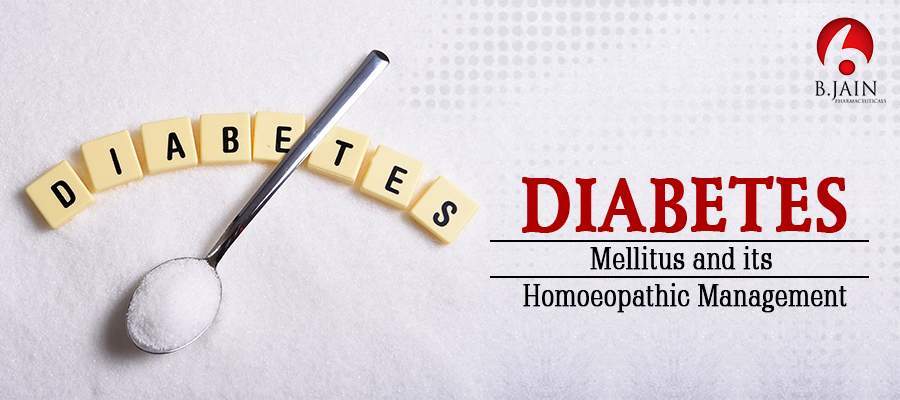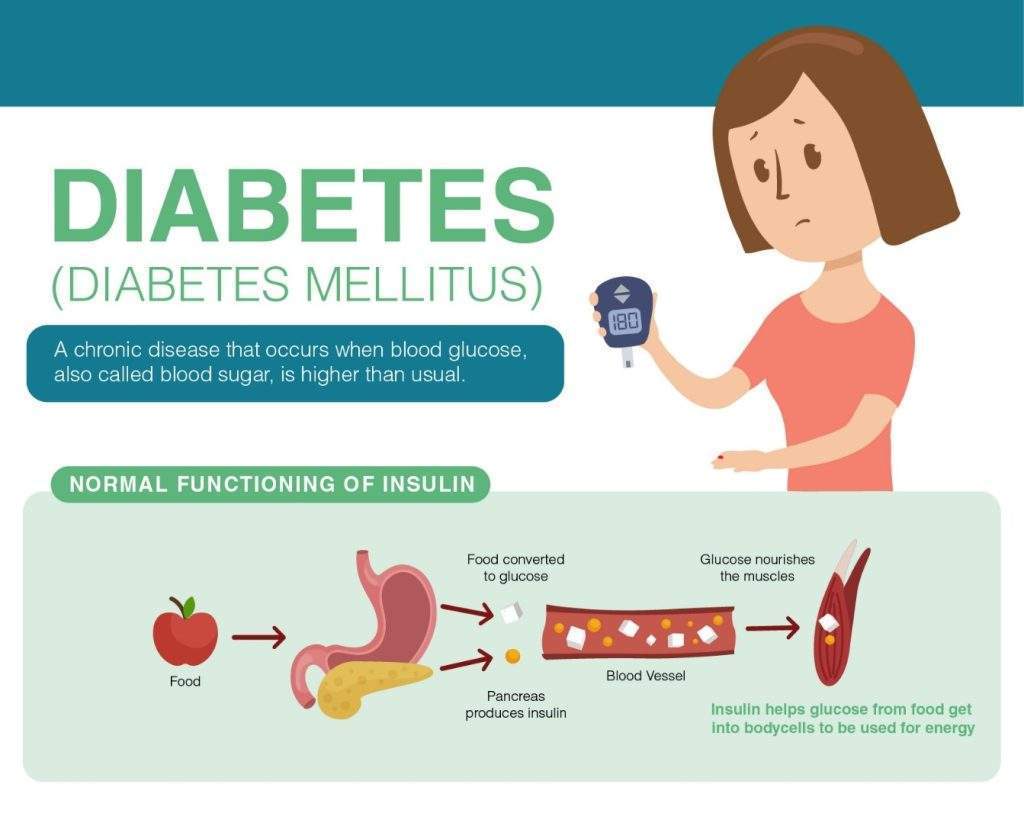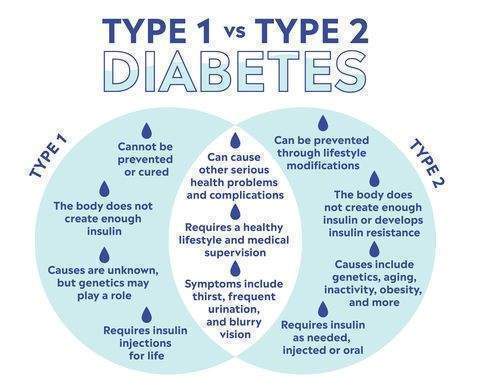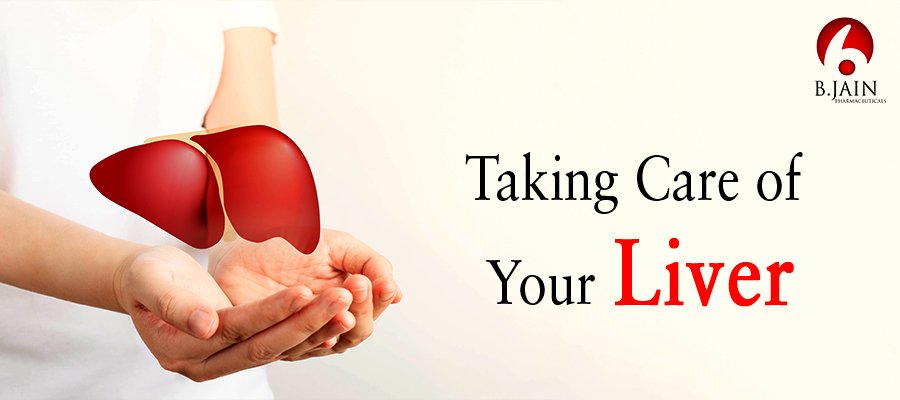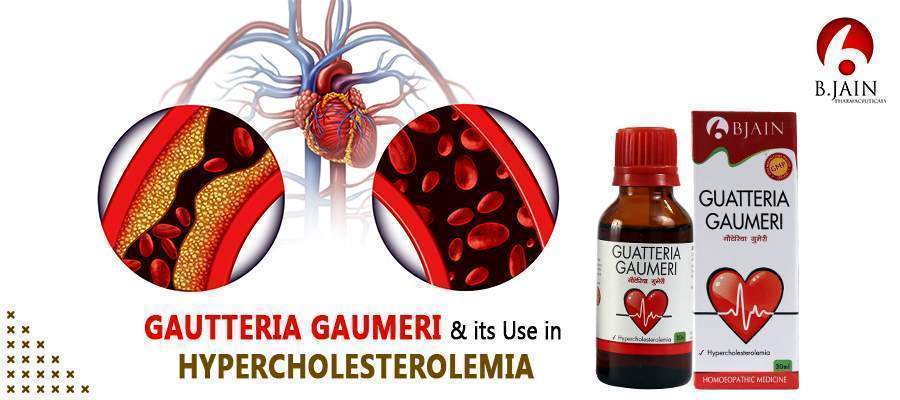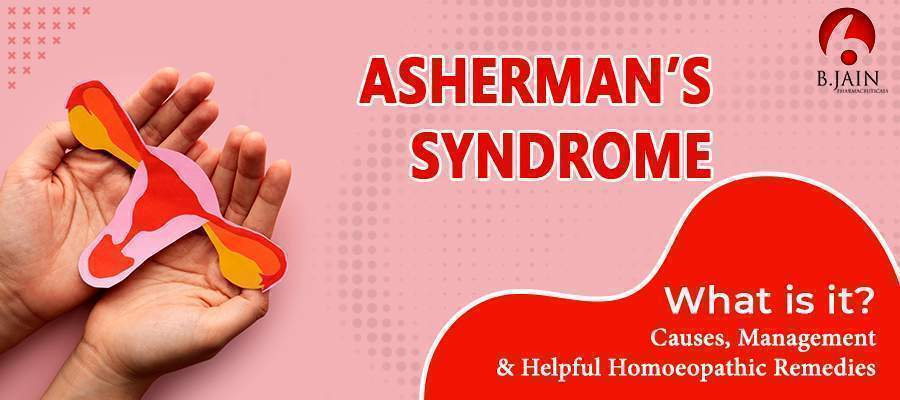What is Diabetes Mellitus?
Diabetes is a metabolic disorder that affects the metabolism of glucose in the body. The basic issue that arises is an increased amount of glucose levels in the blood due to reduced uptake by the cells or due to ineffective metabolism that leads to its accumulation in the flowing blood. This leads to impairment of functions of the organs where the accumulations take place giving rise to symptoms such as irregular heart functioning, retinopathy, ulcers, nephropathy and neuropathy as an effect of the cause of high blood sugar levels.
The Endocrine Tissues of the Pancreas known as the Islets of Langerhans have two types of cells- Alpha and Beta:
- The Alpha cells produce Glucagon which increases the blood sugar levels by a process called Glycogenolysis by which the hepatocytes in the liver hydrolyze stored glycogen to produce glucose.
- The Beta Cells on the other hand produce Insulin that regulates the blood sugar levels by increasing their absorption from the blood into the liver, fat and muscle cells. It is an anabolic hormone and helps in increasing the glucose stores of the body. Its presence in the blood also inhibits the liver from producing glucose.
Types of Diabetes Mellitus
There are 3 types of Diabetes Mellitus, namely:
- Type 2 Diabetes
- Type 1 Diabetes
- Gestational Diabetes
- Type 2 Diabetes Mellitus
The most commonly seen form of Diabetes is Type II Diabetes. It is a lifestyle disorder and it develops due to a lack of insulin in the blood stream. This lack of insulin causes more glucose lying around unprocessed in the blood which in turn damages the cells and results in complications such as diabetic neuropathy, retinopathy and nephropathy. It can also cause gangrene and ulcers at extremities due to a stagnation of glucose rich blood becoming a fertile ground for bacterial growth.
The cause of this disease is a condition known as Insulin resistance and is generally seen at an older age, usually above 40.
Symptoms of Type 2 Diabetes include:
- Polyuria or Increased frequency of Urination
- Increased Thirst or polydipsia
- Increased Hunger or polyphagia
- Fatigue or weakness
- Tingling in Hands and Feet and also burning of soles at night
- Blurring of Vision
- Increased Frequency of opportunistic Infections such as Candidiasis
- Erectile Dysfunction in Men
Causes of Type 2 Diabetes include:
- Obesity or over weight increases the risk of diabetes
- Genetic Factors play a major role
- Age as it is usually seen in people above 40 years of age
- Stress
- Unhealthy diet including both unhealthy food as well as missing meals or consuming them at inappropriate times
- Sedentary Lifestyle due to desk jobs or indolence
Management of Type 2 Diabetes is essential along with medication and includes:
- Improved Diet and addition of foods with low glycemic index
- Exercise and Weight management to prevent complications and added on diseases such as hypertension and heart troubles
- Avoiding Stress as mental health also plays a major role
- Regular Checks of Blood Sugar Levels to monitor the disease
2. Type 1 Diabetes Mellitus
Type I Diabetes is an autoimmune disorder that causes Insulin dependency. This means that the pancreas start to destroy the cells producing Insulin. This result in the body having a lack of insulin which then needs to be provided extrinsically to prevent complications. It is also known as Juvenile Diabetes as it is usually seen at a younger age. Other than being autoimmune, causes can also include a viral infection or trauma and injury to the pancreas.
Symptoms of Type 1 Diabetes Include:
- Polyuria or Increased frequency of Urination
- Increased Thirst or polydipsia
- Increased Hunger or polyphagia
- Fatigue or weakness
- Sudden weight loss.
Management of Type 1 Diabetes Mellitus requires lifelong extrinsic Insulin Therapy to be administered regularly which is why it is also called Insulin Dependent Diabetes.
3. Gestational Diabetes:
Gestational Diabetes is a condition seen in pregnancy that gets resolved post-delivery. It can be a predictor of Diabetes in the future in pregnant mothers who have an elevated blood sugar level during pregnancy. It can cause troubles during the pregnancy as well as anomalies in the baby if left untreated.
It should be noted that Diabetes Insipidus is not related to Diabetes Mellitus as such and is a neurological or renal condition resulting from issues with Vasopressin, also called Diuretic hormone, its production and metabolism in the body. It causes the body to increase the production of urine, a symptom commonly seen in regular Diabetes as well and hence the name.
Diagnosing Diabetes Mellitus
An Endocrinologist or an Internal Medicine Specialist usually handles cases of Diabetes.
Although a General Physician can also prescribe for the same.
The following are the important tests for the Diagnosis of Diabetes Mellitus:
- HbA1c:
Red Blood cells have a lifespan of 3 months and this test detects the presence of Blood sugar levels in them which helps determine the levels of glucose over the last 3 months. It is by far the most useful diagnostic tool in Diabetes Mellitus.
Results below 5.7% are considered to be normal while between 5.7 and 6.4% indicates you have prediabetes, and 6.5% or higher indicates you have diabetes.
- Fasting Blood Sugar Levels:
It is a test of Blood Sugar levels after fasting for at least 8 hours and is usually conducted in the morning on an empty stomach. Fasting levels of 99 mg/dL or lower is normal, 100 to 125 mg/dL indicates you have prediabetes, and 126 mg/dL or higher indicates you have diabetes.
- Random Blood Sugar Levels:
RBS indicates the Blood Sugar Levels at any time of the day and is done randomly.
A random blood sugar level of 200 mg/dL or higher indicates you have diabetes.
- Glucose Tolerance Test:
Also known as Glucose Challenge Test, it involves collection of 3 blood samples- The first is collected on an empty stomach post which glucose is given orally to the person. The next sample is taken an hour after the administration of glucose while the last sample is taken 2 hours post the consumption of glucose. No other food is permitted during the duration of this test. At the 2 hours’ test, a blood sugar level of 140 mg/dL or lower is considered to be normal, 140 to 199 mg/dL indicates you have prediabetes, and 200 mg/dL or higher indicates you have diabetes. This is usually the test of choice in cases of Gestational Diabetes.
Additionally, and if above the age of 40yrs, your doctor may also recommend ECG and 2D echo of the heart to be done as Diabetes Mellitus significantly increases the risk for Heart Disease and Hypertension.
Homoeopathic Management of Diabetes Mellitus
Diabetes Mellitus is not a curable disease and once established in the body it requires lifelong management. The reason for this is the irreparable damage caused to the pancreas. It can however be tried to be controlled by various modes such as Proper Diet, Regular Exercise and Medicines. Homoeopathy medicine can also be used as a complimentary system.
Homeopathy medicines for Diabetes are also available. Although they cannot cure Diabetes but can help in the management of this disease.
There are many Homoeopathic medicines which can be used, some of them are listed below:
- Syzygium jambolanum: It is prescribed in its Mother Tincture form and is a powerful medicine to control blood sugar levels. It is derived from Black Plum or Jamun which is as it is known to have beneficial effects in Diabetes.
- Abroma augusta: A plant of Indian origin, it is commonly known as Olat kambal. It is used to control the blood sugar levels effectively.
- Cephalandra indica: It is a wild creeper found widely in India. It works as an effective remedy in case of Diabetes.
- Gymnema sylvestre: A woody climbing shrub native to the tropical forests of India, Africa and Australia it is a well-known remedy for high blood sugar levels. Its common name in India literally means the Destroyer of Sugar.
- Acidum Aceticum: It is also a good remedy and is made from Acetic Acid. Additionally, it is helpful in cases of Diabetes Insipidus too.
An excellent specialty medicine covering most of the remedies available in Homeopathy for Diabetes is Omeo Diabeteez Drops by B Jain Pharmaceuticals which is customized to help in the management of Diabetes and its related symptoms.
Your Homoeopath will never try to dissuade you from taking allopathic medicines but due to their long term effects, can help you to gradually decrease their dose. Homoeopathy medicines being gentle on the body can help with the same but it is to be remembered that Diabetes as a disease has no cure. In 2019, Diabetes was the 9th leading cause of death and the numbers keep increasing, the prime reason for this is the change in Human lifestyle, increase in desk jobs and a lack of clean sources of air, water and food.
The primary way to prevent diabetes is to maintain a healthy routine but as we already know, it’s easier said than done.
There are 4 ABCs which are the important factors that need to be noted for the Management of Diabetes:
- Control the A1c levels
- Manage Blood Pressure
- Control Cholesterol levels
- Stop smoking
Read More our blog about – Sinusitis and Some Helpful Homoeopathic Medicines for it

Dr. Priyanka Motwani
Dr. Priyanka Motwani has completed her BHMS from the prestigious Nehru Homeopathic Medical College and Hospital, Delhi and holds a Post Graduate Program in Lean Six Sigma from Isenberg School of Management, The University of Massachusetts, Amherst. She is currently the R&D Head at BJain Pharmaceuticals and has a zeal to learn more and more each day.


